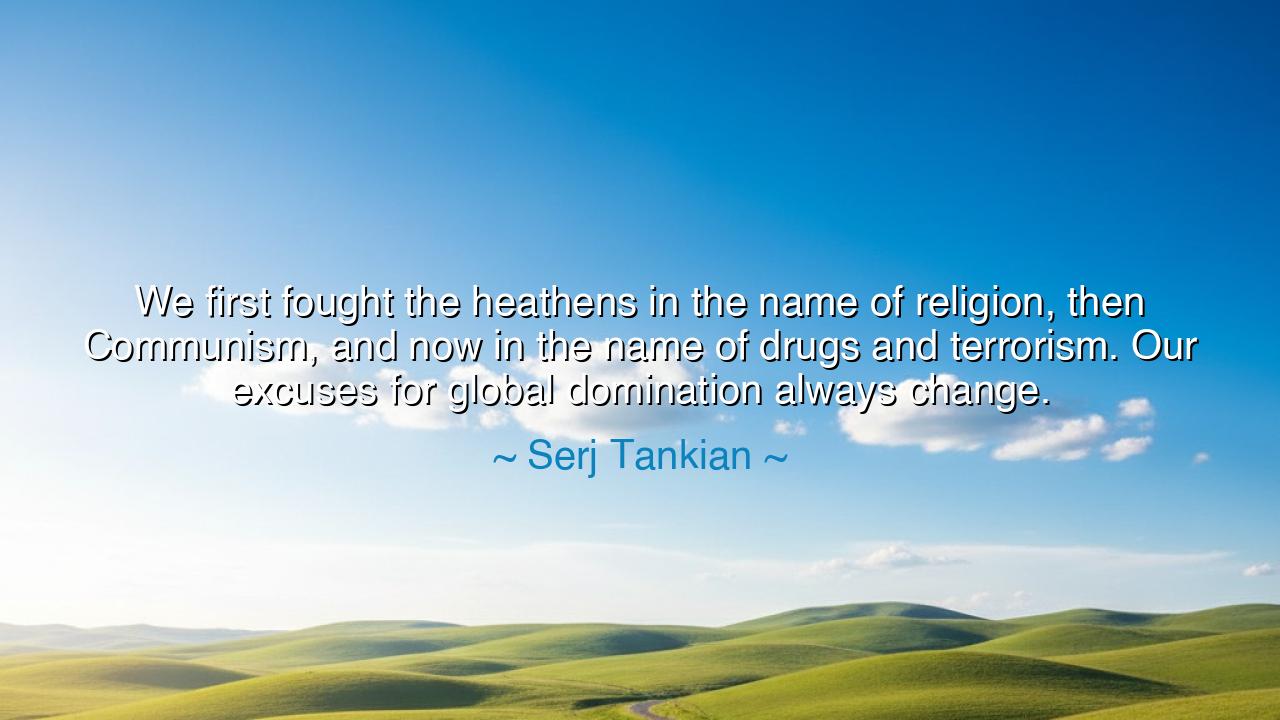
We first fought the heathens in the name of religion, then
We first fought the heathens in the name of religion, then Communism, and now in the name of drugs and terrorism. Our excuses for global domination always change.






"We first fought the heathens in the name of religion, then Communism, and now in the name of drugs and terrorism. Our excuses for global domination always change." These words from Serj Tankian speak to the ever-changing justifications that have been used throughout history to justify global domination, oppression, and war. Tankian's statement highlights the hypocrisy and deception that underlie the actions of powerful nations, who have consistently used various causes, whether religion, political ideologies, or fear of threats, to mask their true motives. At the core of this quote is a timeless truth: that the struggle for power, no matter the era, has been cloaked in noble-sounding excuses that often obscure a far darker reality.
The origin of this critique can be traced back to the ancient philosophers who observed the use of power and authority in human society. Plato, in his writings, warned about the dangers of tyranny and the manipulation of the masses. In his Republic, Plato discussed how rulers, in the name of maintaining order and justice, could easily deceive the people into accepting an unjust system. Similarly, Aristotle explored the corrupting nature of power, noting that it often leads to the creation of justifications for actions that would otherwise be deemed immoral. These ancient thinkers saw how human rulers frequently exploited the idealistic causes of the moment — whether religion, patriotism, or ideology — to mask their true aims of expansion and control.
The Crusades in the Middle Ages are one such example of the religious justification for war and domination. Under the banner of Christianity, European powers launched a series of brutal campaigns against the Muslims in the Holy Land, claiming divine permission to wage war in the name of faith. But while the Crusaders presented themselves as champions of religion, the underlying motives were much more about land, wealth, and power. The Church and kings alike used religion to unite people in a common cause, even as the reality of the Crusades led to countless atrocities and the extension of political control over foreign territories. The excuse for global domination may have been religion, but the true desires lay in empire-building and the pursuit of material gain.
Fast forward to the 20th century, and Communism became the new excuse for geopolitical dominance, particularly during the Cold War. Nations, such as the United States, justified their actions against the spread of Communism with the rhetoric of freedom and democracy, framing their struggle as a fight against tyranny. Yet, as the Vietnam War demonstrated, the reality was far more complex. The US engaged in a brutal and destructive war in Southeast Asia, ostensibly to halt the spread of Communism, but the actions taken were not only about ideology — they were also about maintaining influence and control in the region. The justification of Communism as a threat to freedom masked a broader imperialistic ambition, just as the justifications for war had been veiled in religion centuries earlier.
In the modern era, the war on terror and the fight against drugs have emerged as the latest excuses for global intervention and the expansion of military influence. The United States, following the attacks on September 11, 2001, launched the War on Terror, citing the need to defeat terrorism and ensure global security. Yet, as Tankian points out, these justifications are fluid, constantly shifting to align with the changing political and economic realities. The invasion of Iraq in 2003, for instance, was justified by the need to eliminate weapons of mass destruction, but the true consequences were far more about control of resources and geopolitical power. Similarly, the war on drugs has led to militarized interventions in Latin America, often under the guise of humanitarian aid and drug control, while in reality exacerbating violence and suffering in these regions.
The lesson that Tankian imparts is a stark reminder of the dangers of manipulation and the ease with which powerful nations justify their imperialist ambitions under noble pretexts. This is not a modern phenomenon, but a recurring theme throughout human history — the use of a righteous cause to justify violence and oppression. The human cost of such manipulation is often staggering, as wars are waged, lives are destroyed, and the truth is buried beneath layers of political rhetoric and deception.
To apply this wisdom in our own lives, we must cultivate the ability to discern the true motives behind the actions of those in power. Question the narratives presented to us, especially when they are cloaked in the language of ideology or religion, and examine the real motives behind political decisions. We must strive to look beyond the surface and see whether actions are truly about the well-being of others, or if they are driven by a thirst for control and power. The wisdom of Tankian calls us to be vigilant and critical, to not simply accept the justifications presented by the powerful, but to demand accountability and integrity in the actions of our leaders. In this way, we can help to create a world where true justice prevails, not built on deception and false excuses, but on honesty, compassion, and human dignity.






AAdministratorAdministrator
Welcome, honored guests. Please leave a comment, we will respond soon